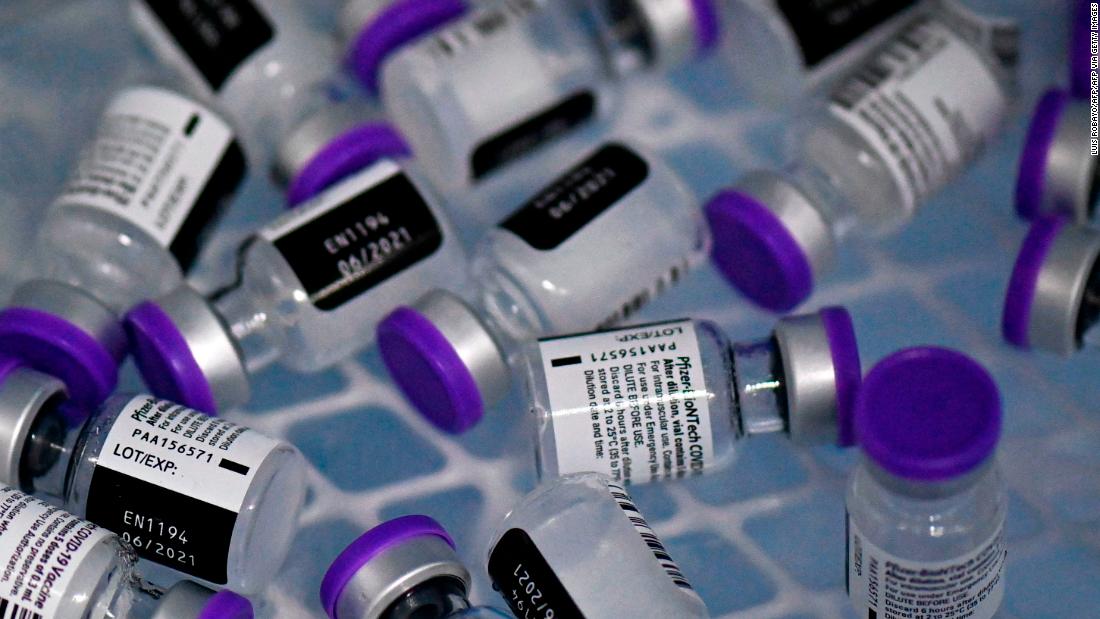
Pfizer and Moderna – the two companies with Covid-19 vaccines approved for emergency use in the United States – have pledged to make a total of 220 million doses available for shipment by the end of March. Meanwhile, Johnson & Johnson, which could obtain emergency authorization for its Covid-19 vaccine from the U.S. Food and Drug Administration later this week, has pledged to make 20 million doses available in the same time frame.
“When emergency use clearance is received this week, we hope to contribute to ending this pandemic as soon as possible,” Dr. Richard Nettles, J & J’s vice president of medical affairs, told lawmakers.
Nettles said the company is ready to ship nearly 4 million doses immediately upon approval of the vaccine.
Executives from each of the vaccine makers, along with executives from AstraZeneca and Novavax, testified before the House Committee on Energy and Commerce Subcommittee on Oversight and Investigations on Tuesday.
A fourth Covid-19 vaccine could become available in the US in April, when AstraZeneca could get FDA approval for its vaccine. Dr. Ruud Dobber, the executive vice president and president of AstraZeneca’s biopharmaceutical business unit, said the company will release 30 million doses immediately upon approval of the vaccine and up to 50 million doses by the end of April.
Pfizer had expected to deliver 30 to 40 million doses to the US by the end of 2020, but only reached the 40 million mark last week. Moderna was set to deliver 20 million doses to the US by the end of 2020, but was a week short. When asked on Tuesday why they were not delivering on time, executives at the companies said access to raw materials and manufacturing a product that had never been made before were both contributing to the problem.
“We initially had some issues with the initial ramp-up of our vaccine,” said John Young, Pfizer’s chief business officer. “In particular, we saw some speed-limiting steps for the raw materials,” added Young.
“In the end – when we tried to make those estimates – we had never manufactured on this scale, so we had to learn a lot along the way,” said Dr. Stephen Hoge, the president of Moderna. “Looking back, maybe we could have started earlier in that process and lined up all the critical raw materials earlier, would we have got there a little faster instead of the first week of January, last week of December? possible. Certainly afterwards, which is 20-20 for us. “
The five drug companies have contracts with the US government to ultimately provide 1.1 billion doses of vaccine, enough to fully vaccinate nearly 600 million people – nearly twice the US population. Company officials assured lawmakers that they are on track to meet those obligations.
All five said they would not foresee a shortage of raw materials that could get in the way.
“Right now we think we have the supplies and consumables we need,” Hoge said.
Moderna is seeking FDA approval to increase the number of doses in each of its Covid-19 vaccine vials from 10 to a maximum of 15. When asked what the impact would be on the increase, Hoge said it was “significantly increasing the supply would speed up “. and reduce the demand for some critical, high-demand raw materials.
“Clearly, we will take any gain – for example, filling more doses into a bottle -” Hoge said. “We need to get more doses into people’s arms faster.”
In addition to manufacturing and distribution, executives addressed questions about protection as new coronavirus variants spread.
“Adding a new strain to our vaccine is something we have experience with and can do very quickly,” said John Trizzino, Novavax’s Chief Business and Commercial Officer.
Pfizer is looking at a possible booster shot from the third dose.
“We believe there is some emerging evidence that having higher antibody titres may be protective even against new variant strains,” said Young. “We are also in talks with the FDA to potentially develop an improved vaccine against a new variant of concern, should one arise.”

